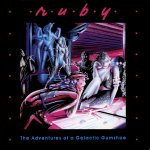
She once described herself as a French peasant cook who drops a carrot in one pot, a piece of potato in another and an onion and a piece of meat in another.
“At dinnertime, you look and see which pot smells best and pull it forward,” she was quoted as saying in a 2001 book, “Madeleine L’Engle (Herself): Reflections on a Writing Life,” compiled by Carole F. Chase.
“The same is true with writing,” she continued. “There are several pots on my backburners.”
Her deeper thoughts on writing were deliciously mysterious. She believed that experience and knowledge are subservient to the subconscious and perhaps larger, spiritual influences.
“I think that fantasy must possess the author and simply use him,” she said in an interview with Horn Book magazine in 1983. “I know that is true of ‘A Wrinkle in Time.’ I cannot possibly tell you how I came to write it. It was simply a book I had to write. I had no choice.
“It was only after it was written that I realized what some of it meant.”
“At dinnertime, you look and see which pot smells best and pull it forward,” she was quoted as saying in a 2001 book, “Madeleine L’Engle (Herself): Reflections on a Writing Life,” compiled by Carole F. Chase.
“The same is true with writing,” she continued. “There are several pots on my backburners.”
Her deeper thoughts on writing were deliciously mysterious. She believed that experience and knowledge are subservient to the subconscious and perhaps larger, spiritual influences.
“I think that fantasy must possess the author and simply use him,” she said in an interview with Horn Book magazine in 1983. “I know that is true of ‘A Wrinkle in Time.’ I cannot possibly tell you how I came to write it. It was simply a book I had to write. I had no choice.
“It was only after it was written that I realized what some of it meant.”




No comments:
Post a Comment